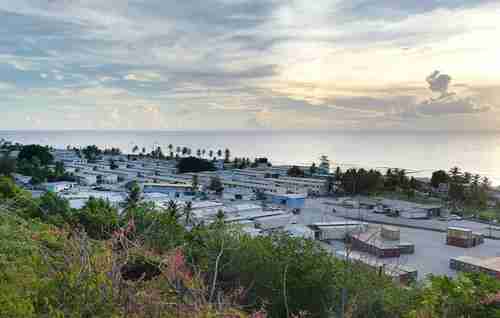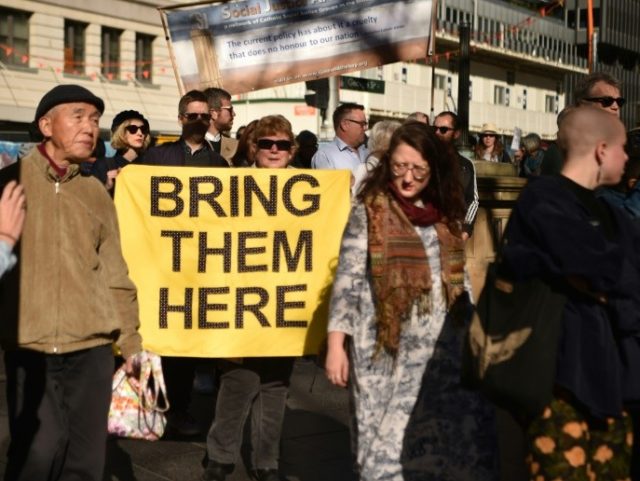This morning’s key headlines from GenerationalDynamics.com
- Australia moves migrant children from Nauru immigration camps to Australia
- Nauru officials infuriated by the contemptuous remarks by NGOs and politicians
Australia moves migrant children from Nauru immigration camps to Australia

Nauru immigration camp (AAP)
As a result of Federal Court orders, the Australian government is in the process of moving all migrant children and their families from Nauru immigration camps to Australian cities and towns. Fifty minors and their families have come to Australia since October 15, for a total of 135 people, and the remaining 35 minors are expected to be transferred by Christmas.
Since August 3, 2013, when the government of Australia signed a Memorandum of Understanding with the government of the Republic of Nauru, refugees and asylum seekers arriving by boat without a visa would be sent either to Nauru or to Manus Island in Papua New Guinea (PNG) and would have “no chance” of being resettled in Australia as refugees.
The decision to send “boat people” to the offshore islands has been extremely controversial, both domestically and internationally, as NGOs claim that the offshore islands are filthy and unsafe. Despite the objections from activists, the policy has been extremely successful in meeting its objectives. While there had previously been tens of thousands of “boat people” per year arriving in Australia, that number has been reduced to almost none, because refugees know that they will be transferred to one of the offshore detention centers. Australian officials claim that thousands of refugees’ lives have been saved since they did not attempt the risky boat trip with human traffickers.
Activists have been using the courts and political pressure to force the government to bring all refugees on the islands to be resettled in Australia. Different government officials since 2013 have all refused, saying that any such move would trigger a new flood of boat people from Indonesia.
New Zealand has volunteered to take 150 refugees from Nauru and PNG and resettle them. However, Home Secretary Peter Dutton has rejected this offer because intelligence surveillance of smuggling operations had detected “increased chatter” and “talk about elections and change of government here,” according to Dutton. “My judgment at the moment, based on all of the advice available to me, is New Zealand would be a pull factor at this point in time.” The phrase “pull factor” refers to a possible resurgence of boat people.
However, Prime Minister Scott Morrison said that he would only consider the New Zealand offer if legislation were passed that would prevent the refugees from simply leaving New Zealand and coming back to Australia.
Dutton says that the government remains committed to never resettle the refugees in Australia, meaning that they will be deported to their countries of origin after hospital treatment.
As a separate issue, the Obama administration in 2016 agreed to accept up to 1,250 refugees from Nauru and Papua New Guinea. ( “6-Feb-17 World View — Trump will honor Australia refugee deal, despite calling it ‘worst deal ever'”)
But after more than a year of screening, only 439 have found new homes in the U.S., and dozens more have rejected the offer to resettle in the United States. According to an NGO, these were mostly people who had family in Australia and were concerned about being separated from them permanently. Sydney Morning Herald and CBS News and Guardian (London) and Australia Government (3-Aug-2013)
Officials of Nauru infuriated by the contemptuous remarks by NGOs and politicians
Australia’s Prime Minister Scott Morrison is warning NGOs and politicians to stop being offensive to Nauru: “For those Nauruans who live there, I do know that they get frankly a bit offended about the way people talk about their home.” Some NGOs have called it an “open-air prison.”
According to Morrison, all the refugee children on Nauru are living freely in the community just like the locals, and that the island nation should not be disrespected: “That is the home of Nauruans – their children live there, their families live there, they go to school there. We should be tempered in our discussion about the nation of Nauru and I think we should treat them with respect.”
Former prime minister Tony Abbott said, “If you like living in the tropics it’s a very, very pleasant island.”
According to the Australian government, 65 medical professionals, including 33 mental health workers, are contracted to serve the refugees on Nauru. According to Abbott, health services are better there than in some parts of regional Australia.
However, these statements are in contrast to warnings by NGOs, the United Nations, and the Australian Medical Association about the appalling state of mental health among young refugees. It was these claims that led to the court order to transfer children to Australia.
The issue is becoming increasingly explosive. A month ago, the government of Nauru expelled the NGO Doctors Without Borders Borders (Médecins Sans Frontières, MSF) which had been providing free mental health care on Nauru. According to Nauru, MSF had originally committed to providing health services for the entire population of 13,000 Nauruans but instead focused on the refugees to further political advocacy.
According to a statement put out by the Nauru government:
For too long, some sections of the media, refugee advocates and some NGOs, have focused only on refugees in Nauru and referred to Nauruans with disdain.
Refugees and locals live side by side as part of a homogenous multicultural community. Calls for refugee children to be removed from our country ignore the fact that Nauruan children grow up here happy, healthy and educated within strong family units. Refugee and asylum seeker children attend school and activities with Nauruan children creating friendships and familial bonds. It is disturbing and concerning that advocates and organizations with political agendas prey on the vulnerable and innocent to progress their agendas. …
The statements made by MSF expose their ruse. It has become very clear that they were never here to help Nauruans as was their initial representation to Government to gain entry into Nauru. They were here as political activists and it was self-evident from the statement made by MSF representatives referring to our sovereign nation, which is our beloved home, as an “open air prison”. This was least expected from an organization proclaiming to be an international humanitarian organization. Nauru has opened its home to refugees awaiting resettlement options. MSF must not define our home as a prison. It speaks of the organization itself.
Nauru is a tiny island, 21 sq km, in the middle of the Pacific. Inhabited for at least 3,000 years, originally by 12 Polynesian and Micronesian tribes, its nearest neighbor, Kiribati, is 300 km of empty ocean away. Nauru was a German colony in the 19th century and an Australian protectorate in the 20th, until independence in 1969, at which time it was one of the wealthiest countries in the world.
It had a massive supply of mineral phosphate. It was strip-mined by mining companies, who packed it up and sold it overseas to be used as fertilizer. Profits were placed into a trust which, at its peak, was valued at $1 billion.
But Nauru became independent in 1969, and then the politicians took over. A series of corrupt and incompetent governments wasted the money and left the country broke and barren by the 1980s, with an unemployment rate of 70 percent. Since then, Australia has had to provide aid to them.
The “boat people” situation has provided an extremely controversial opportunity for both countries. For Nauru, it provided a way to earn extra millions of dollars by housing the refugees. For Australia, it provided a place to send them. Australia AP and NPR and Naura Government and News.com (Australia) and Guardian (London)
Related Articles
- Australia sends refugees to Taiwan hospitals to keep them from Australian soil (24-Jul-2018)
- Australia to send ‘boat people’ to Papua New Guinea (21-Jul-2013)
- Australia will pay $100K each to asylum seekers in Manus Island immigration camp (15-Jun-2017)
- Papua New Guinea Supreme Court bombshell throws Australia’s refugee policy into chaos (30-Apr-2016)
- Hundreds of Australian migrants to be resettled in the United States (11-Nov-2016)
- Trump will honor Australia refugee deal, despite calling it ‘worst deal ever’ (06-Feb-2017)
KEYS: Generational Dynamics, Australia, Nauru, Papua New Guinea, PNG, Manus Island, Scott Morrison, Peter Dutton, New Zealand, Tony Abbott, Doctors Without Borders, Médecins Sans Frontières, MSF
Permanent web link to this article
Receive daily World View columns by e-mail

COMMENTS
Please let us know if you're having issues with commenting.